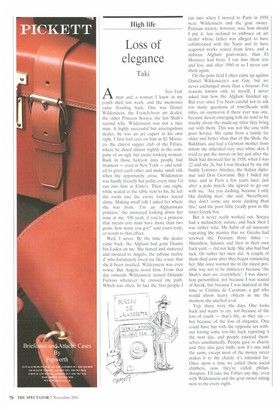High life
Loss of elegance
Taki
ANew York
man and a woman I knew in my youth died last week, and the memories came flooding back. One was Daniel Wildenstein, the French-born art dealer; the other Princess Soraya, the last Shah's second wife. Wildenstein was not a nice man. A highly successful but unscrupulous dealer, he was an art expert in his own right. I first laid eyes on him in El Morocco, the chicest supper club of the Fifties, where he dined almost nightly in the company of an ugly but exotic-looking woman. Back in those halcyon days people had manners — even in New York — and tended to greet each other and make small talk when the opportunity arose. Wildenstein was hardly friendly but polite every time I'd run into him at Elmo's. Then one night. while seated at the table next to his, he left the room and the exotic looker stayed alone. Making small talk I asked her where she was from. 'I'm an Afghanistan i princess, she answered looking down her nose at me. 'Oh yeah, if you're a princess that means you must have more than two goats, how many you got?' said yours truly, or words to that effect.
Well. I never, By the time the dealer came back, the Afghani had gone Osama bin Laden on me. She fumed and stuttered and shouted to Angelo, the urbane maitre d' who fortunately loved me like a son, that she'd been insulted. Wildenstein was even worse. But Angelo stood firm. From that day onwards Wildenstein turned Orlando Furioso whenever he crossed my path. Which was often. In fact the first people I
ran into when I moved to Paris in 1958 were Wildenstein and the goat owner. Parisian society, however, was, how should I put it, less inclined to embrace an art dealer whose father was alleged to have collaborated with the Nazis and to have acquired works seized from Jews, and a dubious Afghani goat-owner, than El Morocco had been. I ran into them less and less, and after 1960 or so I never saw them again.
On the polo field I often came up against Daniel Wildenstein's son Guy, but we never exchanged more than a bonjour. For reasons known only to myself, I never asked him how the Afghani finished up. But ever since I've been careful not to ask too many questions of towelheads with titles, an oxymoron if there ever was one, because desert-emerging folk do tend to be touchy about the made-up titles they bring out with them. This was not the case with poor Soraya. She came from a family far older and better than that of the Shah, the Bakhtiari, and had a German mother from whom she inherited very nice white skin. I tried to put the moves on her just after the Shah had divorced her in 1958, when I was 22 and she 26, but I was blocked by my old buddy Lorenzo Attolico, the Italian diplomat and Don Giovanni. But I bided my time, and in Paris a few years later, just after a polo match, she agreed to go out with me. 'Are you dashing. because I only like dashing men.' she said. 'Sweetheart, they don't come any more dashing than this,' said the poor little (really poor at the time) Greek boy.
But it never really worked out. Soraya had a melancholy nature, and back then I was rather wild. My habit of ad nauseam repeating the mantra that we Greeks had screwed the Persians three times — Marathon, Salamis and then in their own back yard — did not help. She also had had luck. Or rather her men did. A couple of them died soon after they began romancing her. She once warned me in the nicest possible way not to be indiscreet because 'the Shah's men are everywhere'. I was discretion personified, not because I was scared of Savak, but because I was married at the time to Cristina de Caraman, a girl who would throw heavy objects at me the moment she smelled a rat.
Yep, those were the days. One looks back and wants to cry, not because of the loss of youth — that's life, as they say — but because of the loss of elegance. One could have fun with the opposite sex without having some low-life hack reporting it the next day, and people enjoyed themselves unashamedly. People gave to charity and they also gave balls: now it's one and the same, except most of the money never makes it to the charity it's intended for. Once upon a time we called them social climbers, now they're called philanthropists. I'll take the Fifties any day, even with Wildenstein and the goat owner sitting next to me every night.


















































































 Previous page
Previous page